研究生英语综合教程上课文及翻译
- 格式:docx
- 大小:65.21 KB
- 文档页数:44
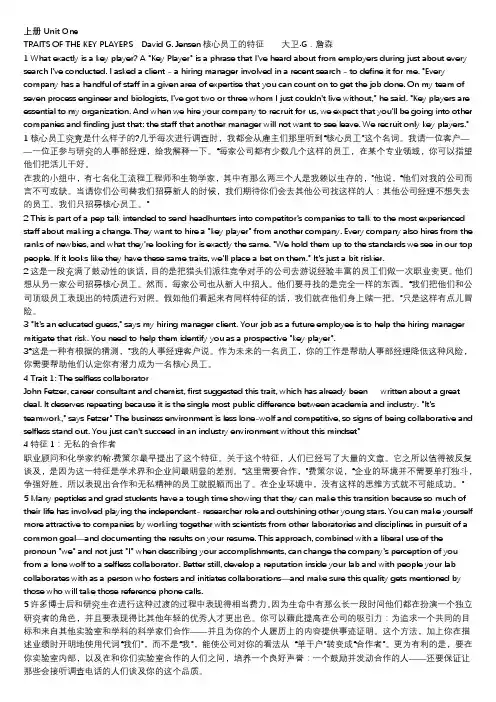
上册Unit OneTRAITS OF THE KEY PLAYERS David G. Jensen核心员工的特征大卫·G.詹森1 What exactly is a key player? A "Key Player" is a phrase that I've heard about from employers during just about every search I've conducted. I asked a client - a hiring manager involved in a recent search - to define it for me. "Every company has a handful of staff in a given area of expertise that you can count on to get the job done. On my team of seven process engineer and biologists, I've got two or three whom I just couldn't live without," he said. "Key players are essential to my organization. And when we hire your company to recruit for us, we expect that you'll be going into other companies and finding just that: the staff that another manager will not want to see leave. We recruit only key players." 1核心员工究竟是什么样子的?几乎每次进行调查时,我都会从雇主们那里听到“核心员工”这个名词。
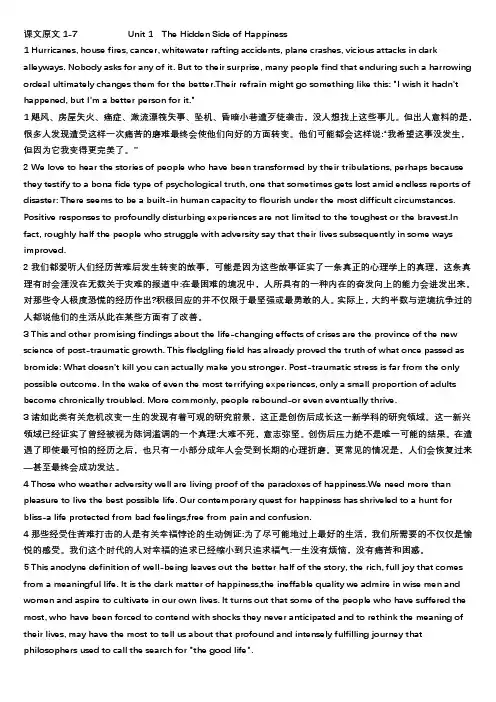
课文原文1-7 Unit 1 The Hidden Side of Happiness1 Hurricanes, house fires, cancer, whitewater rafting accidents, plane crashes, vicious attacks in dark alleyways. Nobody asks for any of it. But to their surprise, many people find that enduring such a harrowing ordeal ultimately changes them for the better.Their refrain might go something like this: "I wish it hadn't happened, but I'm a better person for it."1飓风、房屋失火、癌症、激流漂筏失事、坠机、昏暗小巷遭歹徒袭击,没人想找上这些事儿。
但出人意料的是,很多人发现遭受这样一次痛苦的磨难最终会使他们向好的方面转变。
他们可能都会这样说:“我希望这事没发生,但因为它我变得更完美了。
”2 We love to hear the stories of people who have been transformed by their tribulations, perhaps because they testify to a bona fide type of psychological truth, one that sometimes gets lost amid endless reports of disaster: There seems to be a built-in human capacity to flourish under the most difficult circumstances. Positive responses to profoundly disturbing experiences are not limited to the toughest or the bravest.In fact, roughly half the people who struggle with adversity say that their lives subsequently in some ways improved.2我们都爱听人们经历苦难后发生转变的故事,可能是因为这些故事证实了一条真正的心理学上的真理,这条真理有时会湮没在无数关于灾难的报道中:在最困难的境况中,人所具有的一种内在的奋发向上的能力会进发出来。
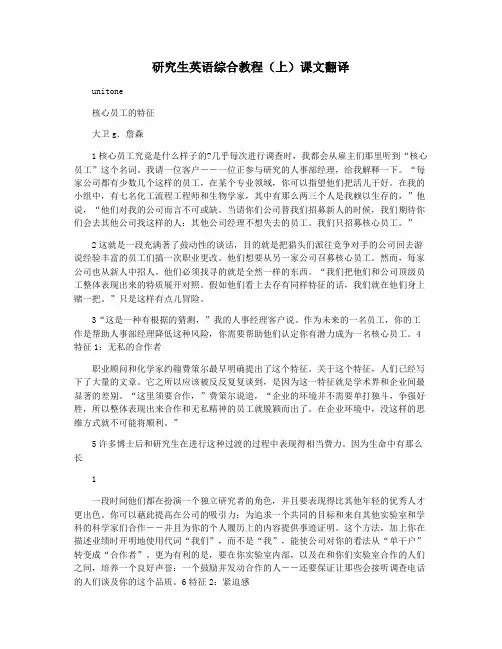
研究生英语综合教程(上)课文翻译unitone核心员工的特征大卫g.詹森1核心员工究竟是什么样子的?几乎每次进行调查时,我都会从雇主们那里听到“核心员工”这个名词。
我请一位客户――一位正参与研究的人事部经理,给我解释一下。
“每家公司都有少数几个这样的员工,在某个专业领域,你可以指望他们把活儿干好。
在我的小组中,有七名化工流程工程师和生物学家,其中有那么两三个人是我赖以生存的,”他说,“他们对我的公司而言不可或缺。
当请你们公司替我们招募新人的时候,我们期待你们会去其他公司找这样的人:其他公司经理不想失去的员工。
我们只招募核心员工。
”2这就是一段充满著了鼓动性的谈话,目的就是把猎头们派往竞争对手的公司回去游说经验丰富的员工们搞一次职业更改。
他们想要从另一家公司召募核心员工。
然而,每家公司也从新人中招人。
他们必须找寻的就是全然一样的东西。
“我们把他们和公司顶级员工整体表现出来的特质展开对照。
假如他们看上去存有同样特征的话,我们就在他们身上赌一把。
”只是这样有点儿冒险。
3“这是一种有根据的猜测,”我的人事经理客户说。
作为未来的一名员工,你的工作是帮助人事部经理降低这种风险,你需要帮助他们认定你有潜力成为一名核心员工。
4特征1:无私的合作者职业顾问和化学家约翰费策尔最早明确提出了这个特征。
关于这个特征,人们已经写下了大量的文章。
它之所以应该被反反复复谈到,是因为这一特征就是学术界和企业间最显著的差别。
“这里须要合作,”费策尔说道,“企业的环境并不需要单打独斗,争强好胜,所以整体表现出来合作和无私精神的员工就脱颖而出了。
在企业环境中,没这样的思维方式就不可能将顺利。
”5许多博士后和研究生在进行这种过渡的过程中表现得相当费力。
因为生命中有那么长1一段时间他们都在扮演一个独立研究者的角色,并且要表现得比其他年轻的优秀人才更出色。
你可以藉此提高在公司的吸引力:为追求一个共同的目标和来自其他实验室和学科的科学家们合作――并且为你的个人履历上的内容提供事迹证明。

研究生英语综合教程(上)课文翻译-详细版Unit One核心员工的特征大卫·G.詹森1核心员工究竟是什么样子的?几乎每次进行调查时,我都会从雇主们那里听到“核心员工”这个名词。
我请一位客户——一位正参与研究的人事部经理,给我解释一下。
“每家公司都有少数几个这样的员工,在某个专业领域,你可以指望他们把活儿干好。
在我的小组中,有七名化工流程工程师和生物学家,其中有那么两三个人是我赖以生存的,”他说,“他们对我的公司而言不可或缺。
当请你们公司替我们招募新人的时候,我们期待你们会去其他公司找这样的人:其他公司经理不想失去的员工。
我们只招募核心员工。
”2这是一段充满了鼓动性的谈话,目的是把猎头们派往竞争对手的公司去游说经验丰富的员工们做一次职业变更。
他们想从另一家公司招募核心员工。
然而,每家公司也从新人中招人。
他们要寻找的是完全一样的东西。
“我们把他们和公司顶级员工表现出的特质进行对照。
假如他们看起来有同样特征的话,我们就在他们身上赌一把。
”只是这样有点儿冒险。
3“这是一种有根据的猜测,”我的人事经理客户说。
作为未来的一名员工,你的工作是帮助人事部经理降低这种风险,你需要帮助他们认定你有潜力成为一名核心员工。
4特征1:无私的合作者职业顾问和化学家约翰·费策尔最早提出了这个特征。
关于这个特征,人们已经写了大量的文章。
它之所以值得被反复谈及,是因为这一特征是学术界和企业间最明显的差别。
“这里需要合作,”费策尔说,“企业的环境并不需要单打独斗,争强好胜,所以表现出合作和无私精神的员工就脱颖而出了。
在企业环境中,没有这样的思维方式就不可能成功。
”5许多博士后和研究生在进行这种过渡的过程中表现得相当费力。
因为生命中有那么长一段时间他们都在扮演一个独立研究者的角色,并且要表现得比其他年轻的优秀人才更出色。
你可以藉此提高在公司的吸引力:为追求一个共同的目标和来自其他实验室和学科的科学家们合作——并且为你的个人履历上的内容提供事迹证明。
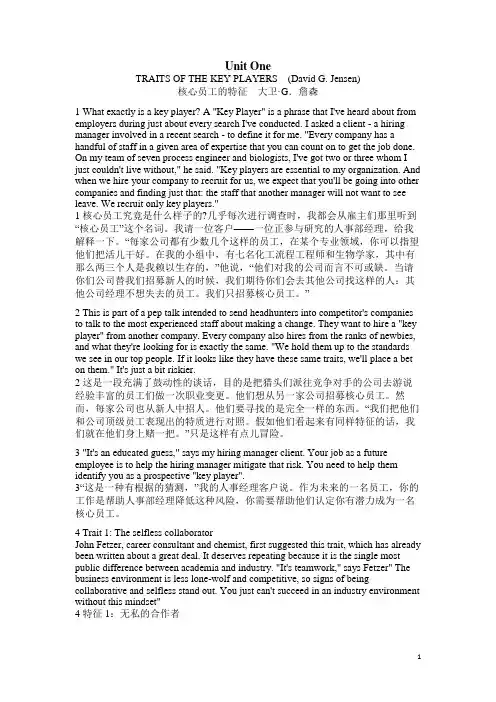
Unit OneTRAITS OF THE KEY PLAYERS (David G. Jensen)核心员工的特征大卫·G.詹森1 What exactly is a key player? A "Key Player" is a phrase that I've heard about from employers during just about every search I've conducted. I asked a client - a hiring manager involved in a recent search - to define it for me. "Every company has a handful of staff in a given area of expertise that you can count on to get the job done. On my team of seven process engineer and biologists, I've got two or three whom I just couldn't live without," he said. "Key players are essential to my organization. And when we hire your company to recruit for us, we expect that you'll be going into other companies and finding just that: the staff that another manager will not want to see leave. We recruit only key players."1核心员工究竟是什么样子的?几乎每次进行调查时,我都会从雇主们那里听到“核心员工”这个名词。

UNIT11. Recently, one of us had the opportunity to speak with a medical student about a research rotation that the student was planning to do. She would be working with Dr. Z, who had given her the project of writing a paper for which he had designed the protocol, collected the data, and compiled the results. The student was to do a literature search and write the first draft of the manuscript. For this she would become first author on the final publication. When concerns were raised about the proposed project, Dr. Z was shocked. "l thought I was doing her a favor," he said innocently, "and besides, I hate writing!"2. Dr. Z is perhaps a bit naive. Certainly, most researchers would know that the student's work would not merit first authorship. They would know that "gift" authorship is not an acceptable research practice. However, an earlier experience in our work makes us wonder. Several years ago, in conjunction with the grant from the Fund for the Improvement of Pott Secondary Education (FIPSE), a team of philosophers and scientists at Dartmouth College 2 ran a University Seminar series for faculty on the topic "Ethical Issues in scientific Research."At one seminar, a senior researcher (let's call him Professor R) argued a similar position to that of Dr. Z. In this case Professor R knew that "gift" authorship, authorship without a significant research contribution, was an unacceptable research practice. However, he had a reason to give authorship to his student.The student had worked for several years on a project suggested by him and the project had yielded to publishable data. Believing that he had a duty to the student to ensure a publication, Professor R had given the student some data that he himself had collected and told the student to write it up. The student had worked hard, he said, albeit on another project, and the student would do the writing. Thus, he reasoned, the authorship was not a "gift."3. These two stories point up a major reason for encouraging courses in research ethics: Good intentions do not necessarily result in ethical decisions. Both of the faculty members in the above scenarios "meant well." In both cases, the faculty members truly believed that what they were doing was morally acceptable. In the first case, Dr. Z's indefensible error was that he was unaware of the conventions of the field.In particular, he seemed blissfully oblivious to the meaning of first authorship. In the second case, Professor R was do ng what he thought best for the student without taking into consideration that moral. ty is a public system and that his actions with regard to a single student have public consequences for the practice of science as a profession.4. Well-meaning scientists, such as those just mentioned, can, with the best of intentions, make unethical decisions. In some cases, such decisions may lead individuals to become embroiled in cases of 1. 最近,我们当中的一员有机会与一名医科学生谈论她正计划要做的一个实验室轮转项目。
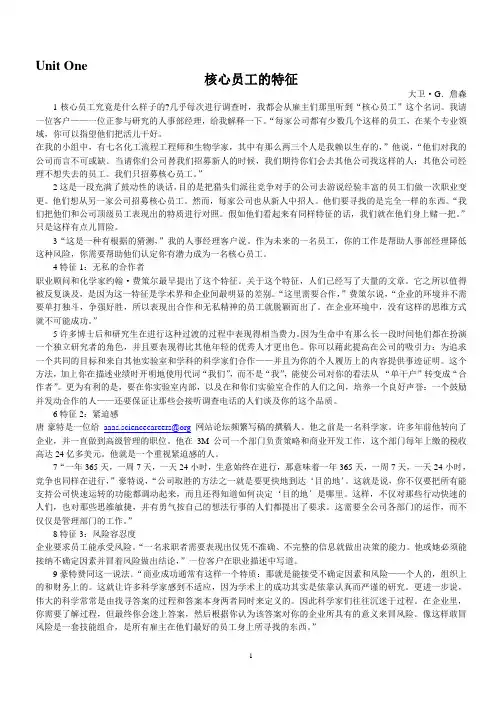
Unit One核心员工的特征大卫·G.詹森1核心员工究竟是什么样子的?几乎每次进行调查时,我都会从雇主们那里听到“核心员工”这个名词。
我请一位客户——一位正参与研究的人事部经理,给我解释一下。
“每家公司都有少数几个这样的员工,在某个专业领域,你可以指望他们把活儿干好。
在我的小组中,有七名化工流程工程师和生物学家,其中有那么两三个人是我赖以生存的,”他说,“他们对我的公司而言不可或缺。
当请你们公司替我们招募新人的时候,我们期待你们会去其他公司找这样的人:其他公司经理不想失去的员工。
我们只招募核心员工。
”2这是一段充满了鼓动性的谈话,目的是把猎头们派往竞争对手的公司去游说经验丰富的员工们做一次职业变更。
他们想从另一家公司招募核心员工。
然而,每家公司也从新人中招人。
他们要寻找的是完全一样的东西。
“我们把他们和公司顶级员工表现出的特质进行对照。
假如他们看起来有同样特征的话,我们就在他们身上赌一把。
”只是这样有点儿冒险。
3“这是一种有根据的猜测,”我的人事经理客户说。
作为未来的一名员工,你的工作是帮助人事部经理降低这种风险,你需要帮助他们认定你有潜力成为一名核心员工。
4特征1:无私的合作者职业顾问和化学家约翰·费策尔最早提出了这个特征。
关于这个特征,人们已经写了大量的文章。
它之所以值得被反复谈及,是因为这一特征是学术界和企业间最明显的差别。
“这里需要合作,”费策尔说,“企业的环境并不需要单打独斗,争强好胜,所以表现出合作和无私精神的员工就脱颖而出了。
在企业环境中,没有这样的思维方式就不可能成功。
”5许多博士后和研究生在进行这种过渡的过程中表现得相当费力。
因为生命中有那么长一段时间他们都在扮演一个独立研究者的角色,并且要表现得比其他年轻的优秀人才更出色。
你可以藉此提高在公司的吸引力:为追求一个共同的目标和来自其他实验室和学科的科学家们合作——并且为你的个人履历上的内容提供事迹证明。
这个方法,加上你在描述业绩时开明地使用代词“我们”,而不是“我”,能使公司对你的看法从“单干户”转变成“合作者”。
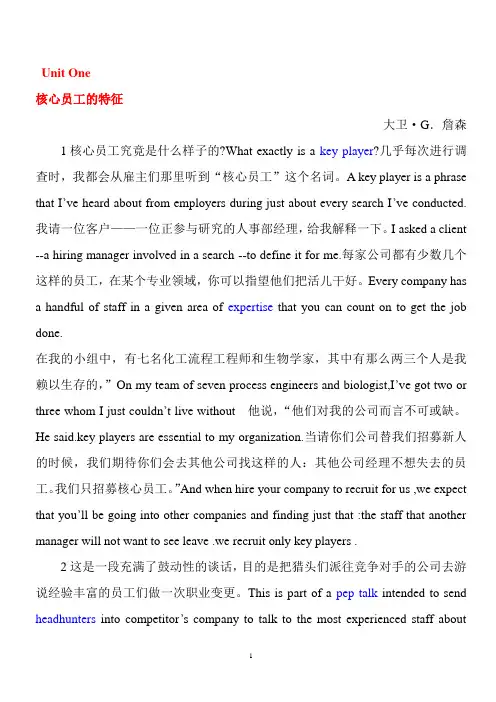
Unit One核心员工的特征大卫·G.詹森1核心员工究竟是什么样子的?What exactly is a key player?几乎每次进行调查时,我都会从雇主们那里听到“核心员工”这个名词。
A key player is a phrase that I’ve heard about from employers during just about every search I’ve conducted.我请一位客户——一位正参与研究的人事部经理,给我解释一下。
I asked a client --a hiring manager involved in a search --to define it for me.每家公司都有少数几个这样的员工,在某个专业领域,你可以指望他们把活儿干好。
Every company has a handful of staff in a given area of expertise that you can count on to get the job done.在我的小组中,有七名化工流程工程师和生物学家,其中有那么两三个人是我赖以生存的,”On my team of seven process engineers and biologist,I’ve got two or three whom I just couldn’t live without 他说,“他们对我的公司而言不可或缺。
He said.key players are essential to my organization.当请你们公司替我们招募新人的时候,我们期待你们会去其他公司找这样的人:其他公司经理不想失去的员工。
我们只招募核心员工。
”And when hire your company to recruit for us ,we expect that you’ll be going into other companies and finding just that :the staff that another manager will not want to see leave .we recruit only key players .2这是一段充满了鼓动性的谈话,目的是把猎头们派往竞争对手的公司去游说经验丰富的员工们做一次职业变更。
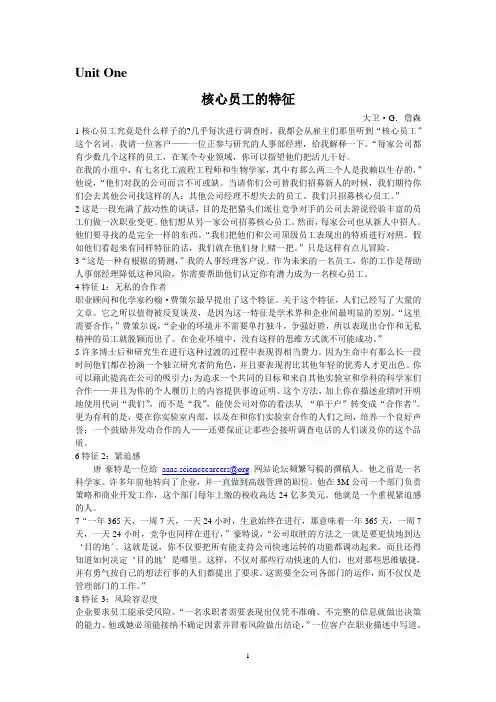
Unit One核心员工的特征大卫·G.詹森1核心员工究竟是什么样子的?几乎每次进行调查时,我都会从雇主们那里听到“核心员工”这个名词。
我请一位客户——一位正参与研究的人事部经理,给我解释一下。
“每家公司都有少数几个这样的员工,在某个专业领域,你可以指望他们把活儿干好。
在我的小组中,有七名化工流程工程师和生物学家,其中有那么两三个人是我赖以生存的,”他说,“他们对我的公司而言不可或缺。
当请你们公司替我们招募新人的时候,我们期待你们会去其他公司找这样的人:其他公司经理不想失去的员工。
我们只招募核心员工。
”2这是一段充满了鼓动性的谈话,目的是把猎头们派往竞争对手的公司去游说经验丰富的员工们做一次职业变更。
他们想从另一家公司招募核心员工。
然而,每家公司也从新人中招人。
他们要寻找的是完全一样的东西。
“我们把他们和公司顶级员工表现出的特质进行对照。
假如他们看起来有同样特征的话,我们就在他们身上赌一把。
”只是这样有点儿冒险。
3“这是一种有根据的猜测,”我的人事经理客户说。
作为未来的一名员工,你的工作是帮助人事部经理降低这种风险,你需要帮助他们认定你有潜力成为一名核心员工。
4特征1:无私的合作者职业顾问和化学家约翰·费策尔最早提出了这个特征。
关于这个特征,人们已经写了大量的文章。
它之所以值得被反复谈及,是因为这一特征是学术界和企业间最明显的差别。
“这里需要合作,”费策尔说,“企业的环境并不需要单打独斗,争强好胜,所以表现出合作和无私精神的员工就脱颖而出了。
在企业环境中,没有这样的思维方式就不可能成功。
”5许多博士后和研究生在进行这种过渡的过程中表现得相当费力。
因为生命中有那么长一段时间他们都在扮演一个独立研究者的角色,并且要表现得比其他年轻的优秀人才更出色。
你可以藉此提高在公司的吸引力:为追求一个共同的目标和来自其他实验室和学科的科学家们合作——并且为你的个人履历上的内容提供事迹证明。
这个方法,加上你在描述业绩时开明地使用代词“我们”,而不是“我”,能使公司对你的看法从“单干户”转变成“合作者”。
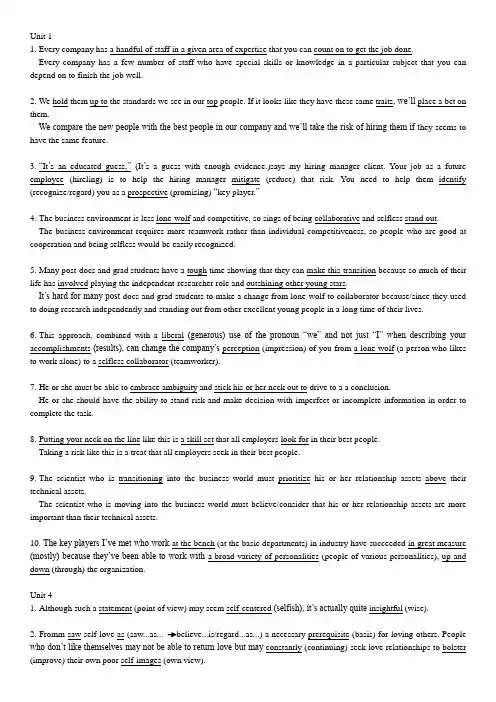
Unit 11. Every company has a handful of staff in a given area of expertise that you can count on to get the job done.Every company has a few number of staff who have special skills or knowledge in a particular subject that you can depend on to finish the job well.2. We hold them up to the standards we see in our top people. If it looks like they have these same traits, we’ll place a bet on them.We compare the new people with the best people in our company and we’ll take the risk of hiring them if t hey seems to have the same feature.3.“It’s an educated guess,”(It’s a guess with enough evidence.)says my hiring manager client. Your job as a future employee (hireling) is to help the hiring manager mitigate (reduce) that risk. You need to help them identify (recognize/regard) you as a prospective (promising) “key player.”4.The business environment is less lone-wolf and competitive, so sings of being collaborative and selfless stand out.The business environment requires more teamwork rather than individual competitiveness, so people who are good at cooperation and being selfless would be easily recognized.5.Many post-docs and grad students have a tough time showing that they can make this transition because so much of their life has involved playing the independent-researcher role and outshining other young stars.It’s hard for many post-docs and grad students to make a change from lone-wolf to collaborator because/since they used to doing research independently and standing out from other excellent young people in a long time of their lives.6.This approach, combined with a liberal (generous) use of the pronoun “we” and not just “I” when describing your accomplishments (results), can change the company’s perception (impression) of you from a lone wolf (a person who likes to work alone) to a selfless collaborator (teamworker).7.He or she must be able to embrace ambiguity and stick his or her neck out to drive to a a conclusion.He or she should have the ability to stand risk and make decision with imperfect or incomplete information in order to complete the task.8.Putting your neck on the line like this is a skill set that all employers look for in their best people.Taking a risk like this is a treat that all employers seek in their best people.9.The scientist who is transitioning into the business world must prioritize his or her relationship assets above their technical assets.The scientist who is moving into the business world must believe/consider that his or her relationship assets are more important than their technical assets.10.The key players I’ve met who work at the bench (at the basic departments) in industry have succeeded in great measure (mostly) because they’ve been able to work with a broad variety of personalities (people of various personalities), up and down (through) the organization.Unit 41.Although such a statement (point of view) may seem self-centered (selfish), it’s actually quite insightful (wise).2. Fromm saw self-love as (saw...as... believe...is/regard...as...) a necessary prerequisite (basis) for loving others. People who don’t like themselves may not be able to return love but may constantly (continuing) seek love relationships to bolster (improve) their own poor self-images (own view).People who don’t like themselves may unable to return love, however, because they don’t think too much of themselves, they may keep seeking love relationships to improve it.3.Love is an elusive concept. Love is hard to define.4.Love has been a source of inspiration (sudden creative ideas), wry witticisms (humorous and even dis-pleasant words), and even political action for many centuries.Love has caused people to do man things they might not otherwise.5.It can be romantic, exciting, obsessive (addicted/fascinating), and irrational (unreasonable). It can also be platonic (affectionable /non-sexual), calming, altruistic (selfless), and sensible (reasonable).It can be romantic, exciting, unreasonable and it can make people think of the other one they love all the time.6.A willingness to please and accommodate the other person, even if this involves compromise and sacrifice.They are willing to please the other person and compromise the other person, even if this means giving in and giving up our benefits.7. Although love may involve (needs/means/include) passionate yearning (strong desire), respect is a more important quality. Respect is inherent (lies/a common character) in all love:”I want the loved person to grow and unfold (develop) for his own sake (benefits), and in his own ways, and not for the purpose of serving (pleasing) me”.8.These misconceptions (wrong views) often lead to (cause) unrealistic expectations, stereotypes (out-of-date practices), and disillusionment (disenchantment). In fact, “real” love is closer to what one author called “stirring-the-oatmeal (ordinary) love”. This type of love is neither exciting nor thrilling (electrifying) but is relatively (comparatively) mundane (ordinary) and unromantic (simple).9.We will never meet millions of potential (possible) lovers because they are “filtered out” (separated out/removed) by formal or informal rules on partner eligibility (qualification).10.In early adolescence (early stage of puberty), peer norms (contemporary standards) influence the adolescent’s (young people’s) decisions about acceptable romantic involvements(relationship/behaviors). Even during the preteen years (before thirteen), romantic experiences are cultured/cultivated (activated) in the sense that societal and group practices and expectations shape (decide) romantic experience. Although romance may cross cultural or ethnic (racial) borders, criticism and approval teach us what is acceptable romantic behavior and with whom. One might “lust” (has strong desire) for someone, but these yearnings will not l ead most of us to “fall in love” if there are strong cultural or group bans (society and group restriction).(划线的整部分也可替换为make most of us fall in love if cultural or group prohibited strongly. )11.Desire may or may not lead to (result in) romantic love (which the authors equate (equal) with passionate or erotic (sexual) love).12.Desire is an essential (necessary/important) ingredient (element/factor) for initiating (in titillating/starting/sparking) and maintaining (keeping) romantic love.13.Once desire diminishes (decreases/lessens/fades out/fades away/weakens), disappointed lovers may wonder where the “spark (passio n)” in their relationship has gone and may reminisce (recall) regretfully (and longingly) about “the good old days”Unit 71.A study of history reveals (shows)that the people who walked this earth in antiquity (lived on earth in ancient times) weremoved (driven) by the same fundamental (essential) forces, were swayed (controlled) by the same passions (strong emotion), and had the same aspirations (ambition) as the men and women of today. The pursuit (seeking) of happiness still engrosses (steeped in) mankind the world over.2. Each man sees himself as (regard as) unique, and so far as he is concerned the hub (and for himself he is the center) of the universe, different from any other individual.3.Every man unfolds (develop) a distinct (particular) character over which circumstances and education have only the most limited control.4.But each must interpret (analyze) events and fit them into the mosaic (make them be a part) of his own life’s pattern.5.Each holds to (sticks to) the structure of the mold (model) into which the soul was cast (shaped) at the time of its individualization (at the time of birth/ when they were born ).6.But nothing can permanently modify them (change them forever), noting can obliterate (eliminate/remove/erase/delete) them.7.The constancy (continuance/stability) of human nature is proverbial (well known), as no one believes that a man can fundamentally (radically/basically) change his nature. (逗号前面也可改为It is well known that human nature is permanent,)8.Nor does a thief become a trustworthy (reliable) employee,or a miser (money grubber/someone who hates spending money and likes saving it) a philanthropist (a rich person who gives a lot of money to help poor people). Nor does a man change and become a liar (person who likes telling lies), coward (weakling/ craven) or traitor (betrayer) at fifty or sixty.9.Man is perfect as a seed is perfect, germinally (originally/in the beginning). The spirit is perfect, but when it inhabits (reside/stay/dwell) human structures (bodies), it participates (take part/get involved) in the imperfections of the latter; and during its association (connection) with matter takes on (displays/shows) the mortal (human being) weaknesses, desires and limitations. But the spirit, the inner man, remains untouched (perfect) and undefiled by (pure from) evil.10.The outer man, too, was originally (germinally/in the first place) perfect, but man has so desecrated (spoiled) and abused (improper or excessive/over use)it that today it is a far cry from (very different from) the original model (what it like originally).11. Man’s majesty (dignity/prestige) and nobility (nobleness/greatness) are taken for granted (Man believes he deserve...), although his faults and weaknesses are constantly paraded (continually exposed/exhibited) before our eyes. Only when behavior deviates (differents/ diverges) from the normal does it attract attention. The good neighbor, the conscientious citizen (citizen of good conscience), the kind father and faithful (reliable) husband pass unnoticed (is neglected/ignored). But the murderer, robber or wife beater is singled out for publicity (always become the focus of public attention), because such conduct is unusual.12.Man’s inherent (born/innate) goodness, moreover, is revealed (reflected/shown) by his countless (numberless) acts of heroism (heroic acts), unselfishness and sacrifice (dedication/the acts of giving up benefits even life). Daily one read of men saving others at the peril of (by risking/at the risk of) their own lives. One plunges (jumps/dives) into the surf (waves) and rescues (saves) a swimmer from drowning; another dashes into (rushes into) a burning house and carries a stranger to safety (out of danger); others snatch (pull) a child from the wheels of death; many give their blood so that others may live. Countless (numberless) unnamed and unrecorded men have given their lives for their fellowmen (the people of their own country), not only on the battlefront (front-line) but on the home-front (rear area) as well.13.Human nature does not and cannot change but unfolds (develops/shows/displays) its inherent (born/innate) pattern. Man has a nature and its laws (rules) can be known. We can only endeavor (try very hard) to understand man as he is (what it is originally).Unit 91.But the scarcity of (lack of) affordable housing is a deepening national crisis (more and more serious national crisis), and not just for inner-city families on welfare. The problem has climbed the income ladder (affected the middle class) and moved to the suburbs, where service workers cram (live with) their families into overcrowded (in apartments which are too crowded) apartments, college graduates have to crash (live) with their parents, and firefighters, police officers and teacher can’t afford to live in the communities they serve (don’t have enough money to buy/can’t pay for the house where they work).2.The real estate boom (prosper/flourish) of the past decade has produced windfalls (made a lot of unexpected money) for Americans who owned before it began, but affordable housing is now a serious problem for more low- andmoderate-income (common/middle-income) Americans than taxes, Social Security or gas prices.3.Roosevelt signed housing legislation (law) in 1934 and 1937, providing mortgages (installment), government apartments and construction jobs for workers down on their luck (workers who were poor because of bad luck). In 1949, Congress set an official goal (aim/target) of “a decent (nice) home and a suitable living environment for every American family,” and in 1974, President Richard M. Nixon began offering subsidized rent vouchers (tickets) to millions of low-income tenants (renters/people who rent private house) in private housing. For half a century, most housing debates (discussion) in Washington revolved around (focus on/centered on) how much to expand federal assistance (extend government’s substances).4.But for the past two decades, the only new federal housing initiative (important plan) has been HOPE VI, a Clinton administration program that has demolished (removed/dismantled) 80,000 units of the worst public housing and built mixed-income developments (apartments) in their place. The program has eliminated (removed/dismantled) most of the high-rise hellholes (terrible high buildings) that gave public housing a bad name and has revived some urban neighborhoods (made some neighborhoods in the city bloom again). But it has razed (destroyed/removed/dismantled) more subsidized apartments (apartments with federal assistance) than it has replaced (been taken place).5.Overall, the number of households receiving federal aid has flat-lined (fall to a very low level) since the early 1990s, despite (in spite of) an expanding ((a)increasing) population and a ballooning (fast growing) budget. Congress has rejected (refused) most of President Bush’s proposed cuts (decreases), but there has been virtually (almostly) no discussion of increase; affordable-housing advocates (supporters) spread most of their time fighting to preserve the status quo (struggling to remain/keep the current situation).6.Some liberals dream of extending subsidies (expanding government’s aid/assistance) to all eligible (qualified)low-income families, but that $100 billion-a-year solution was unrealistic even before the budget deficit ballooned (the federal finance expenditure exceed the plan) again. So even some housing advocates (supporters) now support(backing/stand for) time limits on most federal rent aid. The time limits included in welfare reform 10 years ago were controversial (on the dispute), but studies suggest they’ve helped motivate recipients to get off the dole (stimulate/encourage recipients not to rely on it any more). And unlike welfare, housing aid is not a federal entitlement (one of the right which is endowed by the government), so taking it away from one family after a few years would provide a break for an equally deserving (qualified) family.7.“It’s a no-brainer (obviously),” says David Smith, an affordable-housing advocate (supporter) in Boston. “You can’t sustain the internal contradiction of no limits (maintain/keep the conflict between the family which has already received subsidies and those who hasn’t while they’re also qualified unlimitedly).”8.The root of the problem is the striking (obvious) mismatch (imbalance/gap) between the demand for and the supply of affordable housing-or, more accurately, affordable housing near jobs.9.Other workers are enduring (standing/baring/suffering from) increasingly long commutes (longer and longer travel between home and working place) from less expensive communities, a phenomenon known as “driving to qualify”.10. This creates all kinds of lousy (terrible) outcomes-children who don’t get to see their parents, workers who can’t make ends meet (make enough money to buy what they need) when gas prices soar, exurban sprawl (the city expand to suburb), roads clogged (crowed/blocked) with long-distance commuters emitting (releasing/letting off) greenhouse gases.。
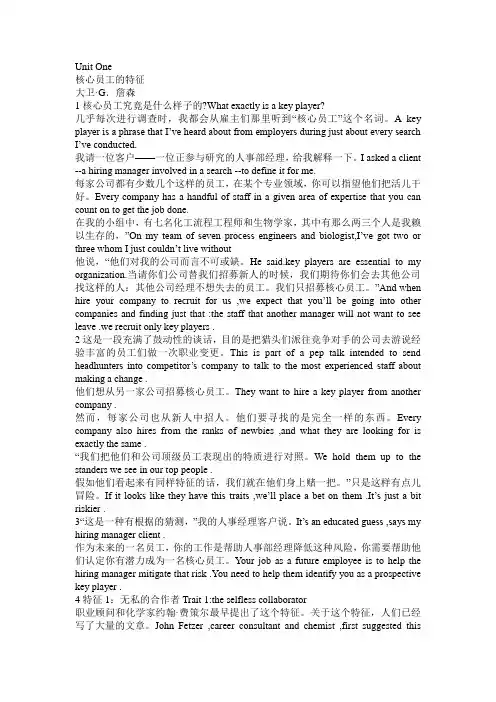
Unit One核心员工的特征大卫·G.詹森1核心员工究竟是什么样子的?What exactly is a key player?几乎每次进行调查时,我都会从雇主们那里听到“核心员工”这个名词。
A key player is a phrase that I’ve heard about from employers during just about every search I’ve conducted.我请一位客户——一位正参与研究的人事部经理,给我解释一下。
I asked a client --a hiring manager involved in a search --to define it for me.每家公司都有少数几个这样的员工,在某个专业领域,你可以指望他们把活儿干好。
Every company has a handful of staff in a given area of expertise that you can count on to get the job done.在我的小组中,有七名化工流程工程师和生物学家,其中有那么两三个人是我赖以生存的,”On my team of seven process engineers and biologist,I’ve got two or three whom I just couldn’t live without他说,“他们对我的公司而言不可或缺。
He said.key players are essential to my organization.当请你们公司替我们招募新人的时候,我们期待你们会去其他公司找这样的人:其他公司经理不想失去的员工。
我们只招募核心员工。
”And when hire your com pany to recruit for us ,we expect that you’ll be going into other companies and finding just that :the staff that another manager will not want to see leave .we recruit only key players .2这是一段充满了鼓动性的谈话,目的是把猎头们派往竞争对手的公司去游说经验丰富的员工们做一次职业变更。
大学研究生英文系列教程综合英语上册课文原文及翻译课文一:HelloHello, everyone! Today, I'm going to introduce myself. My name is Sarah Smith. I am from London, England. I am 25 years old. I am a graduate student majoring in English literature. I am very interested in reading books and writing poems. In my free time, I enjoy playing the piano and traveling to different countries. I am looking forward to getting to know all of you and studying together.你好,大家!今天我要介绍一下我自己。
我的名字是Sarah Smith。
我来自英国伦敦。
我今年25岁。
我是一名英语文学专业的研究生。
我对阅读书籍和写诗非常感兴趣。
在空闲时间,我喜欢弹钢琴和去不同的国家旅行。
我期待着与大家相互认识和一起研究。
课文二:My Hobbies我叫Mark Johnson。
我是一名计算机科学专业的研究生。
除了学术研究,我有很多爱好。
其中一个爱好是打篮球。
我参加了大学篮球队,我们经常与其他大学进行比赛。
我还有一个爱好是弹吉他。
我已经弹吉他五年了。
我觉得这个爱好非常放松和享受。
另外,我也对摄影很感兴趣。
我喜欢用相机捕捉美丽的瞬间。
这些爱好让我忙碌起来,帮助我缓解学业压力。
课文三:My FamilyHello, everyone! Let me tell you about my family. I have a small family. There are four members in my family. My parents, my younger brother, and me. My father is a doctor and my mother is a teacher. They are both very loving and caring. My younger brother is in high school and he is very smart. We all live together in a small house. We always support and help each other. I am very grateful to have such a loving family.大家好!让我告诉你们关于我的家庭。
研究生英语综合教程上课文及翻译unitone核心员工的特征大卫g.詹森13it’saneducatedguess,saysmyhiringmanagerclient.“这就是一种存有根据的猜测,”我的人事经理客户说道。
yourjobasafutureemployeeistohelpthehiringmanagermitigatethatrisk.youneedtohelp themidentifyyouasaprospectivekeyplayer.做为未来的一名员工,你的工作就是协助人事部经理减少这种风险,你须要协助他们判定你存有潜力沦为一名核心员工。
4trait1:theselflesscollaborator特征1:无私的合作者26trait2:asenseofurgency特征2:紧迫感donhautisafrequentcontributortotheaaas.sciencecareers@orgdiscussionforum.唐-豪特就是一位给aaas.sciencecareers@org网站论坛频密撰稿的撰稿人。
heisaformerscientistwhotransitionedtoindustrymanyyearsagoandthenontoaseniorman agement3position.他之前就是一名科学家。
许多年前他转为了企业,并一直努力做到高级管理的职位。
hautheadsstrategyandbusinessdevelopmentforadivisionof3mwithmorethan2.4billioni nannualrevenues.heisamongthosewhovalueasenseofurgency.他在3m公司一个部门负责管理策略和商业研发工作,这个部门每年上交的税收高达24亿多美元。
他就是一个注重紧迫感的人。
8trait3:risktolerance特征3:风险容忍度4需要表现出仅凭不准确、不完整的信息就做出决策的能力。
上册Unit OneTRAITS OF THE KEY PLAYERS David G. Jensen核心员工的特征大卫·G.詹森1 What exactly is a key player? A "Key Player" is a phrase that I've heard about from employers during just about every search I've conducted. I asked a client - a hiring manager involved in a recent search - to define it for me. "Every company has a handful of staff in a given area of expertise that you can count on to get the job done. On my team of seven process engineer and biologists, I've got two or three whom I just couldn't live without," he said. "Key players are essential to my organization. And when we hire your company to recruit for us, we expect that you'll be going into other companies and finding just that: the staff that another manager will not want to see leave. We recruit only key players." 1核心员工究竟是什么样子的?几乎每次进行调查时,我都会从雇主们那里听到“核心员工”这个名词。
研究生综合英语(上)课文翻译研究生综合英语(上)课文翻译1 ”。
西东的找寻所上身工员的好最们他在主雇有所是?合组能技套一是险风冒敢样这像。
险风冒来义意的有具所业企的你对案答该为认你据根后然?案答上迷会你终最但?程过解了要需你?里业企在。
程过于迷沉往往们家学科此因。
的义定来时同者两身本案答和程过的案答寻找由是常常学科的大伟?说步一进更。
究研的谨严而真认靠依是实其功成的上术学为因?应适不到感家学科多许让就这。
的上务财和的上织组?的人个——险风和素因定确不受接能是就那?质特个一样这有常通功成业商“。
法说一这同赞特豪9 。
道写中述描业职在户客位一”?论结出做险风着冒并素因定确不纳接能须必她或他。
力能的策决出做就息信的整完不、确准不凭仅出现表要需者职求名一“。
险风受承能工员求要业企度忍容险风?3征特8 ”。
作工的门部理管是仅仅不而?作运的门部各司公全要需这。
求要了出提都们人的事行法想的己自按气勇有并?捷敏维思些那对也?们人的速快动行些那对仅不?样这。
里哪是’地的目‘定决何如道知得还且而?来起动调都能功的转运速快司公持支能有所把要仅不你?说是就这。
’地的目‘达到地快更要是就一之法方的胜取司公“?说特豪”?行进在样同也争竞?时小42天一?天7周一?天563年一着味意那?行进在终始意生?时小42天一?天7周一?天563年一“7 。
人的感迫紧视重个一是就他。
元美多亿42达高收税的缴上年每门部个这?作工发开业商和略策责负门部个一司公M3在他。
位职的理管级高到做直一并?业企了向转他前年多许。
家学科名一是前之他。
人稿撰的稿写繁频坛论站网给位一是特豪-唐感迫紧?2征特6 。
质品个这的你及谈们人的话电查调听接会些那让证保要还——人的作合动发并励鼓个一?誉声好良个一养培?间之们人的作合室验实们你和在及以?部内室验实你在要?是的利有为更。
”者作合“成变转”户干单“ 从法看的你对司公使能?”我“是不而?”们我“词代用使地明开时绩业述描在你上加?法方个这。
Unit One TRAITS OF THE KEY PLAYERSDavid G. Jensen核心员工的特征大卫·G.詹森1 What exactly is a key player? A "Key Player" is a phrase that I've heard ab out from employers during just about every search I've conducted. I asked a client - a hiring manager involved in a recent search - to define it for me. "Ev ery company has a handful of staff in a given area of expertise that you can count on to get the job done. On my team of seven process engineer and biol ogists, I've got two or three whom I just couldn't live without," he said. "Key players are essential to my organization. And when we hire your company to r ecruit for us, we expect that you'll be going into other companies and finding just that: the staff that another manager will not want to see leave. We recrui t only key players."1核心员工究竟是什么样子的?几乎每次进行调查时,我都会从雇主们那里听到“核心员工”这个名词。
上册Unit OneTRAITS OF THE KEY PLAYERS David G. Jensen核心员工的特征大卫·G.詹森1 What exactly is a key player? A "Key Player" is a phrase that I've heard about from employers during just about every search I've conducted. I asked a client - a hiring manager involved in a recent search - to define it for me. "Every company has a handful of staff in a given area of expertise that you can count on to get the job done. On my team of seven process engineer and biologists, I've got two or three whom I just couldn't live without," he said. "Key players are essential to my organization. And when we hire your company to recruit for us, we expect that you'll be going into other companies and finding just that: the staff that another manager will not want to see leave. We recruit only key players."1核心员工究竟是什么样子的?几乎每次进行调查时,我都会从雇主们那里听到“核心员工”这个名词。
Unit One核心员工的特征大卫·G.詹森1 What exactly is a key player? 核心员工究竟是什么样子的? A key player is a phrase that I’ve heard about from employers during just about every search I’ve conducted. 几乎每次进行调查时,我都会从雇主们那里听到“核心员工”这个名词。
I asked a client --a hiring manager involved in a search --to define it for me. 我请一位客户——一位正参与研究的人事部经理,给我解释一下。
Every company has a handful of staff in a given area of expertise that you can count on to get the job done. 每家公司都有少数几个这样的员工,在某个专业领域,你可以指望他们把活儿干好。
On my team of seven process engineers and biologist,I’ve got two or three whom I just couldn’t live without 在我的小组中,有七名化工流程工程师和生物学家,其中有那么两三个人是我赖以生存的,”He said.key players are essential to my organization. 他说,“他们对我的公司而言不可或缺。
And when hire your company to recruit for us ,we expect that you’ll be going into other companies and finding just that :the staff that another manager will not want to see leave .we recruit only key players . 当请你们公司替我们招募新人的时候,我们期待你们会去其他公司找这样的人:其他公司经理不想失去的员工。
我们只招募核心员工。
”2 This is part of a pep talk intended to send headhunters into competitor’s company to talk to the most experienced staff about making a change . 这是一段充满了鼓动性的谈话,目的是把猎头们派往竞争对手的公司去游说经验丰富的员工们做一次职业变更。
They want to hire a key player from another company . 他们想从另一家公司招募核心员工。
Every company also hires from the ranks of newbies ,and what they are looking for is exactly the same . 然而,每家公司也从新人中招人。
他们要寻找的是完全一样的东西。
We hold them up to the standers we see in our top people . “我们把他们和公司顶级员工表现出的特质进行对照。
If it looks like they have this traits ,we’ll place a bet on them .It’s just a bit riskier . 假如他们看起来有同样特征的话,我们就在他们身上赌一把。
”只是这样有点儿冒险。
3It’s an educated guess ,says my hiring manager client . “这是一种有根据的猜测,”我的人事经理客户说。
Your job as a future employee is to help the hiring manager mitigate that risk .You need to help them identify you as a prospective key player . 作为未来的一名员工,你的工作是帮助人事部经理降低这种风险,你需要帮助他们认定你有潜力成为一名核心员工。
4 Trait 1:the selfless collaborator 特征1:无私的合作者John Fetzer ,career consultant and chemist ,first suggested this trait ,which has already been written about a great deal . 职业顾问和化学家约翰·费策尔最早提出了这个特征。
关于这个特征,人们已经写了大量的文章。
It deserves repeating because it is the single most public difference between academic and industry . 它之所以值得被反复谈及,是因为这一特征是学术界和企业间最明显的差别。
It’s teamwork,says Fetzer .The business environment is less lone-wolf and competitive ,so signs of being collaborative and selfless stand out .You just can’t succeed in an industry environment without this mindset .“这里需要合作,”费策尔说,“企业的环境并不需要单打独斗,争强好胜,所以表现出合作和无私精神的员工就脱颖而出了。
在企业环境中,没有这样的思维方式就不可能成功。
”5 Many postdocs and grad students have a tough time showing that they can make this transition because so much of their life has involved playing the independent-researcher role and outshining other young stars. 许多博士后和研究生在进行这种过渡的过程中表现得相当费力。
因为生命中有那么长一段时间他们都在扮演一个独立研究者的角色,并且要表现得比其他年轻的优秀人才更出色。
You can make yourself more attractive to companies by working together with scientists from other laboratories and disciplines in pursuit of common goal --and documenting the results on your resume . 你可以藉此提高在公司的吸引力:为追求一个共同的目标和来自其他实验室和学科的科学家们合作——并且为你的个人履历上的内容提供事迹证明。
This approach ,combined with a liberal use of the pronoun we and not just I when describing your accomplishments ,can change the company’s perception of you from a lone wolf to a selfless collaborator . 这个方法,加上你在描述业绩时开明地使用代词“我们”,而不是“我”,能使公司对你的看法从“单干户”转变成“合作者”。
Better still ,develop a reputation inside your lab and with people your lab collaborator with as a person who fosters and initiates collaborations --and make sure this quality gets mentioned by those who will take those reference phone calls . 更为有利的是,要在你实验室内部,以及在和你们实验室合作的人们之间,培养一个良好声誉:一个鼓励并发动合作的人——还要保证让那些会接听调查电话的人们谈及你的这个品质。
6 trait 2:a sense of urgency特征2:紧迫感Don Haut is a frequent contributor to the aaas.sciencecareers@org discussion forum . 唐-豪特是一位给aaas.sciencecareers@org 网站论坛频繁写稿的撰稿人。
He is a former scientist who transitioned to industry many years ago and then on to a senior managementposition . 他之前是一名科学家。
许多年前他转向了企业,并一直做到高级管理的职位。
Haut heads strategy and business development for a division of 3M with more than 2.4 billion in annual revenues . He is among those who value a sense of urgency . 他在3M公司一个部门负责策略和商业开发工作,这个部门每年上缴的税收高达24亿多美元。
他就是一个重视紧迫感的人。
7Business happens 24/7/365 ,which means that competition happens 24/7/365 ,as well ,says Haut . “一年365天,一周7天,一天24小时,生意始终在进行,那意味着一年365天,一周7天,一天24小时,竞争也同样在进行,”豪特说,One way that companies win is by getting there faster ,which means that you not only have to mobilize all of the functions that support a business to move quickly ,but you have to know how to decide where there is ! “公司取胜的方法之一就是要更快地到达‘目的地’。